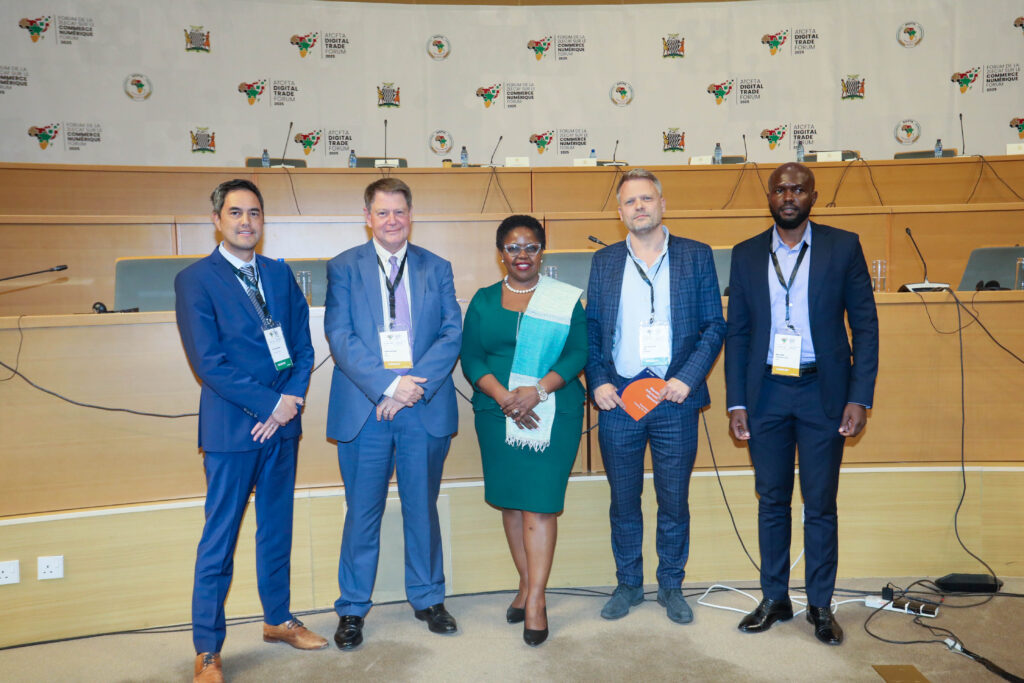On 8 May 2025, the TWIN Foundation was officially launched at the AfCFTA Digital Trade Forum in Lusaka, Zambia. The Foundation marks a significant milestone in global trade digitalisation, bringing together six key organisations – the IOTA Foundation, TradeMark Africa, the World Economic Forum, the Tony Blair Institute for Global Change, the Chartered Institute of Export & International Trade, and the Global Alliance for Trade Facilitation. Together, they will steward the Trade Worldwide Information Network (TWIN), an open-source, decentralised infrastructure designed to make international trade more efficient, transparent, and inclusive.
Within the MISSION project, TWIN plays a foundational role in enabling secure and scalable data exchange for the optimisation of port operations. Built on IOTA’s distributed ledger technology, TWIN is designed to integrate seamlessly with existing digital ecosystems through standardised APIs and a modular, open architecture. Its use of trusted, tamper-evident data contributes directly to MISSION’s aim of ensuring the integrity and auditability of shared information within complex and dynamic port environments.
One of the core strengths of the TWIN infrastructure is its ability to support Just-In-Time port call optimisation. By enabling better coordination and planning of vessel arrivals and departures – even in contexts where connectivity is limited – TWIN addresses long-standing challenges in maritime logistics. This capability enhances the overall responsiveness and efficiency of port operations, positioning TWIN as a vital enabler of MISSION’s objectives.
The TWIN Foundation’s launch also establishes the governance structure necessary to scale TWIN responsibly as a global public good. With neutral oversight, a strong focus on transparency, and a commitment to open access, the TWIN Foundation ensures that the infrastructure remains inclusive and sustainable. Its governance model is designed to support a diverse community of stakeholders – from governments and ports to logistics providers and software developers – while avoiding vendor lock-in and encouraging innovation.

TWIN’s architecture is both open and modular, built to align with global data-sharing initiatives such as Gaia-X and the International Data Spaces Association (IDSA). By embracing these standards and integrating IOTA’s distributed ledger technology, TWIN ensures that data can be exchanged securely, verifiably, and at scale across organisational and jurisdictional boundaries.
This high level of interoperability is also key to MISSION’s planned integration with the European Blockchain Services Infrastructure (EBSI), enhancing the project’s capacity to connect with broader EU and international data networks. Looking ahead, MISSION aims to extend the use of TWIN through AI-driven smart contracts – capable of responding dynamically to data triggers, flagging non-compliance, and supporting real-time decision-making.
The TWIN Foundation’s commitment to open collaboration and technical excellence will help realize the next generation of digital trade infrastructure. By supporting the development of adaptable, interoperable ecosystems, TWIN reduces friction, fosters trust among global actors, and unlocks new opportunities for economic growth and innovation.
In the context of the MISSION project, TWIN represents a critical building block – revolutionising data sharing, empowering port communities, and paving the way for smarter, greener, and more connected maritime logistics.
More information about the TWIN Foundation:
● TWIN on LinkedIn: TWIN Foundation
● TWIN on Twitter/X: TWINGlobalOrg
● IOTA blog post on the launch of the TWIN Foundation
● IOTA blog post on the technical aspects of TWIN
● Statement from Tony Blair on the launch of the TWIN Foundation

